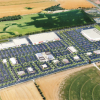People’s Memorial Park, its history, and campaign signs
Faith United Methodist Church Pastor Marjorie Belmont-Burns wrote a letter to the editor recently. She took exception to political signs placed along the highly visible Route 1 frontage near the People’s Memorial Park cemetery.
“It should be obvious to all that a private cemetery is no place for campaigning, but a place of peace, spirituality and remembrance,” she wrote. “Parishioners and others who have family or friends interred at the site have found this practice hurtful and disgraceful.”
Now that Election Day has come and gone, most of the signs placed in the DelDOT right of way abutting the cemetery have been removed. But the circumstances raised curiosity about the history of People’s Memorial Park and DelDOT’s regulations regarding campaign signs in state-owned rights of way.
Doug Melson, of the well-known family of Sussex County funeral directors, spoke with me about the history of the park. First off, about the terms.
People’s Memorial Park is a cemetery in the general sense. But what makes memorial parks different from traditional cemeteries is their requirement for grave markers to be at ground level, probably for ease of maintenance. “There are memorial parks all over the world,” Melson said. “It was the only memorial park in the area for years. Traditionally, dating all the way back to Rome and other ancient places, people wanted to see their name on a tombstone. The more successful they were, the bigger the tombstone. Everybody wanted a big send-off, I guess.”
Melson said in the middle of the 20th century, his father, Clayton Melson, was one of two funeral directors in the Lewes area. “He was the only one at the time who would handle funerals for Black people. He was friendly with them and they became his followers. But one thing my dad knew was that the little Black churches had little or no space on their properties for cemeteries, so he wanted to be helpful.”
Melson said his father had a farmer friend in the area who owned a large farm along what was called Route 14 at the time, at the state highway’s intersection with Route 24. “He convinced his farmer friend – Thornton Hudson – to start a cemetery on eight acres of the land, subtracted from his farm.” That became People’s Memorial Park, and through the decades it has been a burying place for African Americans.
“My dad owned 50 percent of the stock in the People’s Memorial Park corporation, and the Hudson family had the other 50 percent. The family eventually sold off the rest of the farm to the west of the cemetery for commercial development and gave up its stock in the corporation, which is now defunct,” said Melson.
“When I was a kid, our whole family took care of the park like it was our own. Made sure the grass was taken care of and that kind of thing. When my dad died, he left the stock to my mother and when she died, she, without my knowledge, left the stock to me.”
That was a problem, because by that time Delaware had passed a law stating funeral directors could not own cemeteries. When a number of local people who had family buried there expressed interest in taking over the park, Melson had the solution to his problem.
Faith now handling park
Members of Faith United Methodist Church in Rehoboth Beach now take care of People’s Memorial Park and handle arrangements for gravesites.
The members do their best to maintain the memorial park, sponsoring fundraisers, such as chicken barbecues, from time to time to help finance their efforts.
Melson said the cemetery property doesn’t include a 50-foot or so band of land between the adjacent roadways and the gravesites. That land is owned by Delaware’s Department of Transportation as a right of way.
As it turns out, placing election campaign signs in a right of way alongside a cemetery may be insensitive and disrespectful, but it is not illegal. DelDOT allows campaign signs to be placed within its right of way 30 days before and 30 days after an election. They may not, however, be placed within 10 feet of roadway pavement – an area known as the clear zone. Those who violate the regulation are subject to a $25-per-sign fine.
At 77, Doug Melson – who has spent his entire life in the funeral business – is probably one of the last surviving people with direct knowledge about the beginnings of People’s Memorial Park. “I think there’s still plenty of space available,” said Melson. Although once reserved for African Americans, the park now accepts people of all races.
It’s all in keeping with the biblical verse from John 14:2 cited on the cemetery sign and quoting Jesus Christ: “In my Father’s house are many mansions; if it were not so, I would have told you. I go to prepare a place for you.”























































